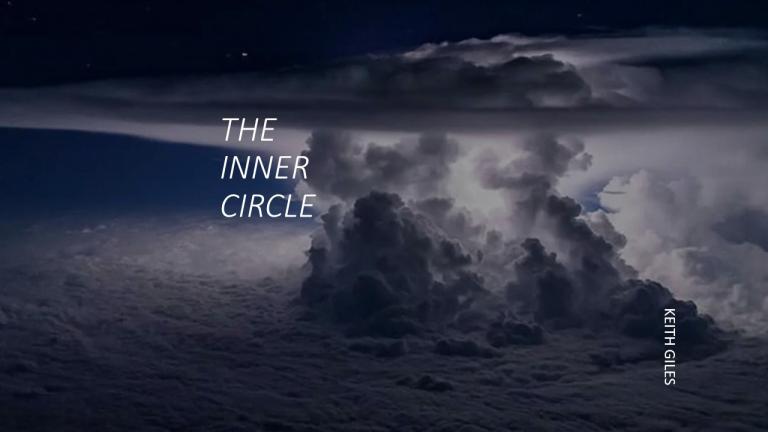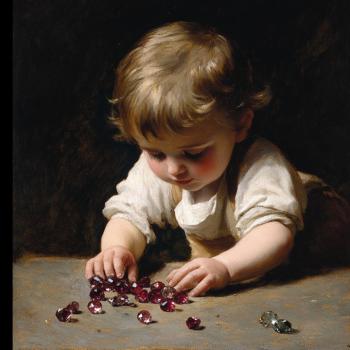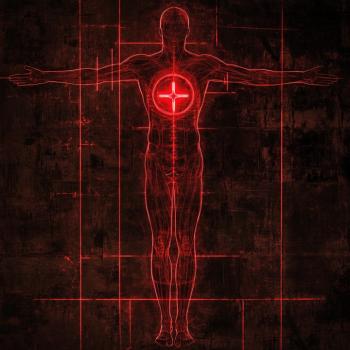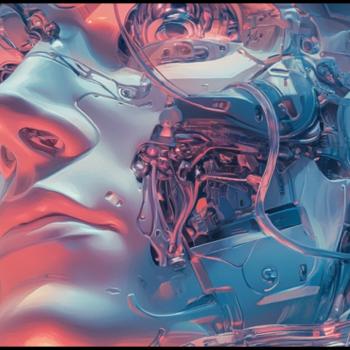
Saying 11: “Jesus said: “This heaven will pass away, and the one above it will pass away; and those who are dead are not alive, and those who are living will not die. In the days when you ate of what is dead, you made of it what is living. When you come to be light, what will you do? On the day when you were one, you became two. But when you have become two, what will you do?”
It’s quite likely that saying 11 is actually two sayings rather than one. We could possibly argue that it’s three sayings in one, but at any rate, the first sentence appears to be about heaven, while the second saying seems to be about the differences between what is alive and what is dead, with a potential third saying focused on what happens one becomes two.
Let’s take each saying one at a time and see if we can make sense of what Jesus is trying to show us here.
In the first saying, Jesus says that “This heaven will pass away, and the one above it will pass away.” What we need to keep in mind is that the “heaven” he is referring to here is not the spiritual reality where we often imagine God dwells. We know this isn’t what Jesus is referring to simply because, all throughout the Gospel of Thomas, we are reminded that God is not separate from God’s creation. Therefore, there is no such thing as a “heaven” where God exists apart from the rest of reality. This idea is an illusion that Jesus has come to eradicate. So, it’s possible on one level that what Jesus means to say is that our concept of heaven as a separate place where God dwells apart from us is what will “pass away” as we begin to realize the truth of our Oneness and connectivity with God.
However, since Jesus adds that “the one above it will [also] pass away”, we might need to reconsider that explanation. It’s more likely that when Jesus refers to “this heaven” he’s talking literally about the sky where the birds of the air fly, and “the one above it” is the realm of the moon, the sun and the stars above us. This was the common use of those terms, even in the New Testament.
When Paul speaks of being taken up into the “third heaven” [2 Cor. 12:2-4], he’s cluing us into the First Century mindset where the first heaven was the sky, the second heaven was outer space, and he third heaven was the spiritual realm where Almighty God was.
So, when Jesus says that “this heaven” and “the one above it will pass away” he’s saying that the first and second heavens are temporary. By default then, the third heaven, which he doesn’t mention by name, is all that will endure for eternity. Why? Because it is the only realm that defines all of reality. Everyone and everything – both God and humanity – exist, right now, together, as one in this third heaven which is all there is or ever will be.
In other words, Jesus is saying that the sky we see by day, and the heavens we see by night are illusions that will one day vanish and cease to exist. The physical realm will eventually crumble and all that will remain is the ultimate reality which is understood to be defined as the Universal Oneness of all things.
Now, let’s look at the second saying found here:
“Those who are dead are not alive, and those who are living will not die. In the days when you ate of what is dead, you made of it what is living.”
As with several other sayings of Jesus from this Gospel of Thomas, the first part of this statement appears to be painfully obvious. Of course, the dead are not alive. That’s why they’re dead. But, then why does Jesus follow this up by saying, “…and those who are living will not die.”? That statement does not appear self-evident. In fact, it’s more than a little confusing. How can Jesus claim that “those who are living will not die”, especially when we have experienced quite the opposite?
Could it be that Jesus wants us to understand that death, like the first and second heavens above us, are not true expressions of reality? If so, then when he says “those who are dead are not alive and those who are living will not die”, he wants us to consider another possibility: that death is an illusion and that those who are alive [as we all are when we begin our lived mortal experience in this world] will remain alive and not die, even if they appear dead for a moment. The illusion of death, like the illusions of the sky and the universe around us, will one day fade away. What will remain is life, and the reality of our eternal Oneness with the Creator of all things, and one another.
Jesus concludes this passage by adding, “In the days when you ate of what is dead, you made of it what is living.” What could this possibly point to? What exactly is meant by “…when you ate of what is dead…”?
One idea might be that he’s referring to “the days when” we once believed in the illusion of death and separation from God and others. Before we understood the truth of Oneness and Connectivity, we were eating or consuming “what is dead” and by doing so, we “made of it what is living.”
Or, in other words, we once believed a lie about reality that tricked us into thinking that what was dead [false] was alive [true]. In contrast, now that we eat of what is alive, what this makes in us is life – true life – that is based on reality rather than illusions.
Perhaps this is why Jesus ends this section by asking us, “When you come to be light, what will you do?” This feels as if it’s flowing directly out of the previous statement where the negative thought of “eating what is dead” is contrasted with what happens when we “come to be light” and realize how we have been living in darkness.
Yet, there is one final question for us to consider which comes back to the notions of division and separation when Jesus rounds out this long saying by asking:
“On the day when you were one, you became two. But when you have become two, what will you do?”
Once more, Jesus wants us to continually question our perception of reality. The “day when [we] were one” is the day you were born into consciousness in this present reality. From the beginning – and even before the beginning – you were One with the Source of all life. But, even as you took your first few breaths in this life, you “became two” when you began to believe the illusion of separation was real. Once you have “become two”, or believed the lie of separation from God and others, “what will you do?” The only hope for you is to return to that place of original Oneness with the One True God whom you can never be separated from – ever.
It’s fascinating to me how often we hear pastors and Bible teachers point to the story of Adam and Eve in Genesis as evidence of our separation from God. Yet, the story never once says that eating of the Tree of the Knowledge of Good and Evil created a separation between God and humanity. Not once. We read of how they were separated from the Tree of Life in the Garden, which was why they were expelled from Eden. But, the story does not say that humanity was ever separated from God at all. In fact, what we read is that God went out from the Garden with them, and clothed them, and cared for them, and watched over them, and their children, just as when they were in the Garden before.
That story also tells us that the lie the serpent told them in the Garden was that they were not already equal with God. What Eve and Adam accepted by eating of the fruit was the lie that they needed something outside of themselves to become like God. How could they be more like God than to be made in God’s image, both male and female? How could they be any more like God than to be filled with the very life breath of God which filled their own lungs and made alive by God’s indwelling presence?
We continually suffer from this same delusion of separation from God today, every time we buy into the notion that God is “up there” and we are “down here”; that our sins prevent God from engaging with us, or loving us, or accepting us, that God is anywhere other than our own inner being.
We are where God is, and God is where we are. We are God’s hands. We are God’s feet. We are God’s voice. We are God’s presence in this world; the Incarnation of Christ where God dwells by His Eternal Spirit.
The more we know this, meditate on this, and live out of this unshakeable truth, the more this truth will transform us and change us into the beautiful image of Christ from the inside out.
**

CAN YOU FIND THE SECRET LINK?
Answer the questions right and you’ll uncover something fun.
**
Keith Giles is the author of the 7-part best-selling Jesus Un book series from Quoir Publishing. Keith is also the host of Second Cup with Keith [a new solo podcast available now on the Ethos Radio App, for Apple and Android and on Spotify; and the Heretic Happy Hour Podcast and the new Apostate’s Anonymous podcast with Matthew Distefano.













